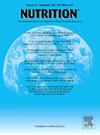Racial/ethnic-derived maternal diets predict birth outcomes better than a diet derived from a combined sample among Hispanic/Latina and non-Hispanic White pregnant individuals in the ECHO Cohort
IF 3.2
3区 医学
Q2 NUTRITION & DIETETICS
引用次数: 0
Abstract
Little is known about diet based on maternal fasting blood glucose (FBG) and birth outcomes in diverse populations. We hypothesized that racial/ethnic-derived FBG-based diets would predict birth outcomes better than a diet derived from the overall sample. Pregnant Hispanic/Latina (n = 420) and non-Hispanic White (n = 564) individuals (combined, n=984) from two Environmental influences on Child Health Outcomes (ECHO) cohorts provided ≥ 1 24-h diet recalls. We evaluated primary (birthweight [BW]-for-age, macrosomia, large-for-gestational age, and preterm birth) and secondary (BW, gestational age [GA] at birth, low birthweight (LBW), and small-for-gestational age) birth outcomes. Reduced-rank regression with maternal FBG was used to derive dietary patterns in the combined and racial/ethnic samples. We used multivariable linear and logistic regression to estimate diet associations with birth outcomes. In each racial/ethnic group, seemingly unrelated estimation with clustering was used to test differences in diet coefficients between combined and racial/ethnic-specific models. The overall sample diet was characterized by higher intakes of refined grains and lower intakes of whole grains, solid fats, and nuts and seeds; racial/ethnic-derived diets were similar, with some exceptions. A one-standard deviation increase in the combined pattern was significantly associated with lower BW-for-age (β = –0.08, 95% confidence interval [CI]: –0.16, –0.004), BW (β = –57.5, 95% CI: –94.8, –20.2), and GA at birth (β = –0.13, 95% CI: –0.24, –0.01) and greater odds of preterm birth (OR = 1.41, 95% CI: 1.03, 1.94) and LBW (OR = 1.62, 95% CI: 1.07, 2.46), with pronounced coefficients in racial/ethnic-derived diets. Overall, racial/ethnic-derived FBG diets predicted adverse birth outcomes better than the diet derived from the overall sample in each racial/ethnic group.
在ECHO队列中,种族/民族来源的母亲饮食比来自西班牙/拉丁裔和非西班牙裔白人孕妇的联合样本的饮食更能预测分娩结果
在不同的人群中,人们对基于母亲空腹血糖(FBG)和分娩结果的饮食知之甚少。我们假设,基于种族/民族的基于fbg的饮食比来自整体样本的饮食更能预测出生结果。来自两个环境影响儿童健康结局(ECHO)队列的怀孕西班牙裔/拉丁裔(n = 420)和非西班牙裔白人(n = 564)个体(合计,n=984)提供≥1个24小时饮食回忆。我们评估了原发性(出生体重[BW]比年龄、巨大儿、大胎龄和早产)和继发性(出生时体重[BW]、胎龄[GA]、低出生体重(LBW)和小胎龄)的出生结局。使用母亲FBG的低秩回归来推导组合样本和种族/民族样本的饮食模式。我们使用多变量线性和逻辑回归来估计饮食与出生结局的关系。在每个种族/族裔群体中,使用看似无关的聚类估计来检验联合模型和种族/族裔特定模型之间饮食系数的差异。总体样本饮食的特点是精制谷物摄入量较高,全谷物、固体脂肪、坚果和种子摄入量较低;种族/民族来源的饮食是相似的,有一些例外。联合模式中一个标准偏差的增加与较低的年龄体重(β = -0.08, 95%可信区间[CI]: -0.16, -0.004)、体重(β = -57.5, 95% CI: -94.8, -20.2)和出生时体重(β = -0.13, 95% CI: -0.24, -0.01)和较高的早产几率(OR = 1.41, 95% CI: 1.03, 1.94)和低体重(OR = 1.62, 95% CI: 1.07, 2.46)显著相关,且在种族/民族来源的饮食中有显著的系数。总体而言,种族/民族来源的FBG饮食比来自每个种族/民族群体的总体样本的饮食更能预测不良的出生结局。
本文章由计算机程序翻译,如有差异,请以英文原文为准。
求助全文
约1分钟内获得全文
求助全文
来源期刊

Nutrition
医学-营养学
CiteScore
7.80
自引率
2.30%
发文量
300
审稿时长
60 days
期刊介绍:
Nutrition has an open access mirror journal Nutrition: X, sharing the same aims and scope, editorial team, submission system and rigorous peer review.
Founded by Michael M. Meguid in the early 1980''s, Nutrition presents advances in nutrition research and science, informs its readers on new and advancing technologies and data in clinical nutrition practice, encourages the application of outcomes research and meta-analyses to problems in patient-related nutrition; and seeks to help clarify and set the research, policy and practice agenda for nutrition science to enhance human well-being in the years ahead.
 求助内容:
求助内容: 应助结果提醒方式:
应助结果提醒方式:


